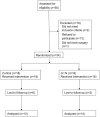Intraoperative maintenance of normoglycemia with insulin and glucose preserves verbal learning after cardiac surgery
- PMID: 24941010
- PMCID: PMC4062428
- DOI: 10.1371/journal.pone.0099661
Intraoperative maintenance of normoglycemia with insulin and glucose preserves verbal learning after cardiac surgery
Abstract
Objective: The hyperglycemic response to surgery may be a risk factor for cognitive dysfunction. We hypothesize that strict maintenance of normoglycemia during cardiac surgery preserves postoperative cognitive function.
Methods: As part of a larger randomized, single-blind, interventional efficacy study on the effects of hyperinsulinemic glucose control in cardiac surgery (NCT00524472), consenting patients were randomly assigned to receive combined administration of insulin and glucose, titrated to preserve normoglycemia (3.5-6.1 mmol L(-1); experimental group), or standard metabolic care (blood glucose 3.5-10 mmol L(-1); control group), during open heart surgery. The patients' cognitive function was assessed during three home visits, approximately two weeks before the operation, and two months and seven months after surgery. The following tests were performed: Rey Auditory Verbal Learning Task (RAVLT for verbal learning and memory), Digit Span Task (working memory), Trail Making A & B (visuomotor tracking and attention), and the Word Pair Task (implicit memory). Questionnaires measuring specific traits known to affect cognitive performance, such as self-esteem, depression, chronic stress and social support, were also administered. The primary outcome was to assess the effect of hyperinsulinemic-normoglycemic clamp therapy versus standard therapy on specific cognitive parameters in patients receiving normoglycemic clamp, or standard metabolic care.
Results: Twenty-six patients completed the study with 14 patients in the normoglycemia and 12 patients in the control group. Multiple analysis of covariance (MANCOVA) for the RAVLT showed a significant effect for the interaction of group by visit (F = 4.07, p = 0.035), and group by visit by recall (F = 2.21, p = 0.04). The differences occurred at the second and third visit. MANCOVA for the digit span task, trail making and word pair association test showed no significant effect.
Conclusions: Preserving intraoperative normoglycemia by intravenous insulin and glucose may prevent the impairment of memory function, both short and long-term, after cardiac surgery.
Conflict of interest statement
Figures


References
-
- Carvalho G, Moore A, Qizilbash B, Lachapelle K, Schricker T (2004) Maintenance of normoglycemia during cardiac surgery. Anesth Analg 99(2): 319–324. - PubMed
-
- Puskas F, Grocott HP, White WD, Mathew JP, Newman MF, et al. (2007) Intraoperative hyperglycemia and cognitive decline after CABG. Ann Thorac Surg 84: 1467–1473. - PubMed
-
- Carvalho G, Pelletier P, Albacker T, Lachapelle K, Joanisse DR, et al. (2011) Cardioprotective effects of glucose and insulin administration while maintaining normoglycemia (GIN therapy) in patients undergoing coronary artery bypass grafting. J Clin Endocrinol Metab 96(5): 1469–1477. - PubMed
-
- Chaney MA, Nikolov MP, Blakeman BP, Bakhos M (1999) Attempting to maintain normoglycemia during cardiopulmonary bypass with insulin may initiate postoperative hypoglycemia. Anesth Analg 89(5): 1091–1095. - PubMed
Publication types
MeSH terms
Substances
Associated data
Grants and funding
LinkOut - more resources
Full Text Sources
Other Literature Sources
Medical
Research Materials

